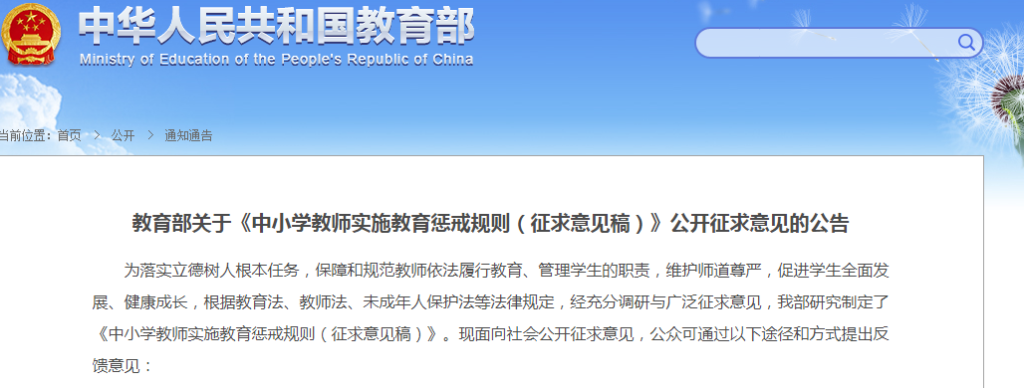Recently, China’s Ministry of Education issued the draft rules of a new regulation on the implementation of educational punishment for primary and secondary school (standard primary and secondary schools, secondary vocational schools, and special education schools) teachers. The new regulation is open to feedback from public opinions until December 22 this year.

To help teachers to achieve better results, the new regulation lists punishments allowed to be carried out by teachers based on three categories according to the severity of the student’s offense, including “naming and shaming”, suspending the student from taking field trips or other group activities outside the class schedule, and notifying the parents immediately.
In response to increasing public concern about school bullying incidents, the rules clearly point out that if students bully classmates, abuse teachers, or commit other acts of misconduct, teachers should ask the school to suspend the student from classes or school for up to one week.
READ MORE: China to Amend the Law on the Prevention of Juvenile Delinquency
Beijing voices on the new regulations
Jolie, a mom of a middle school girl who is now studying in seventh grade of a key public school in Dongcheng District, Beijing, welcomed the move. “But in practice it could be complicated,” she said. “The teacher’s disciplinary measures against students are basically consistent with the content of the new rules, which is appropriate.”
As a mom of a 6-year-old boy, Bing from House of Knowledge strongly agrees with teachers setting boundaries and rules for their children and encourage them to practice them. But if the child is not good at something, corporal punishment is not a good method.
Yi’an, a 6-year-old international school student, said both adults and children should have the same rights. The regulations will not help students behave better. If the adult administers corporal punishment to the child, the child will be more resistant.
From the point of view of a mom who has a special need child, Grace disagrees with the new regulation. “The rules for special needs children, especially children with autism, are very unfriendly.”
She told us that the lack of understanding of rules is a major feature of children with autism. They might show “undisciplined” actions such as not listening to the teachers, violating classroom rules, even having physical conflict with classmates. All those behaviors need the teacher’s guidance, instead of punishments.
READ MORE: Autism Services for Children in China: A Therapist Responds
READ MORE: Beijing Mom Highlights Shortage of Autism Therapists, Despite Offer of Training
READ MORE: The Case for Applied Behavior Analysis: An Interview with Autism Partnership Director, Toby Mountjoy
On the other hand, some teachers said the regulation will at least help students better understand the consequences of misbehaving and that the role of parents is important during the implementation of the regulation.
Meanwhile, in response to the measures taken by the Ministry of Education recently about student discipline, we received some feedback into the issues from Canadian International School of Beijing (CISB) teachers.
The Preschool/Elementary Vice Principal Jenny Sabin told us, when it comes to discipline in instances of inappropriate behavior, they focus on changing the behavior, and not punishment. “So if you made a bad decision on the school bus, you shouldn’t miss lunch. Instead we say ‘This happened on the bus, it is unacceptable, so now you’ll have to sit next to the ayi during the bus ride.’ ” She said. “If a student is too aggressive on the soccer field, then they won’t be able to play on the soccer field for an appropriate period of time.”
Ann Marie Luce, the Preschool/Elementary Principal of CISB, said they want students to feel like they belong to their community. One way that they do that is celebrating cultural diversity in the community.
“We also seek first to understand where such inappropriate behavior is coming from. Are they seeking attention? Are they hungry? Lonely? Are there challenges with language that are making them feel isolated, and leading them to act out? Understanding these issues, and how to help students proactively, helps us prevent behavioral issues later. ” Luce said.
Photo: pexels.com, MOE.com




